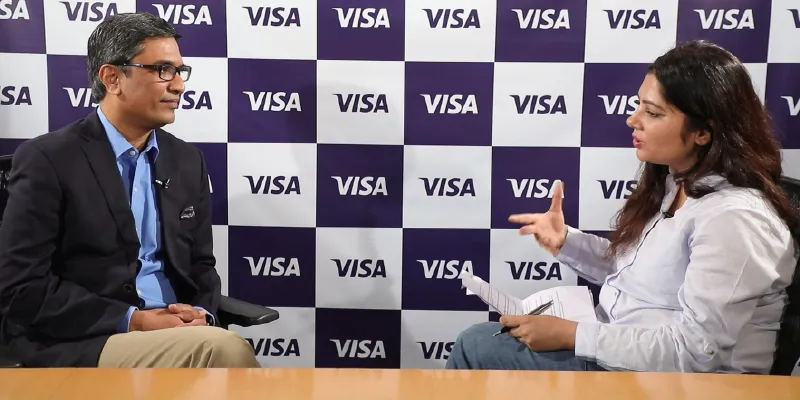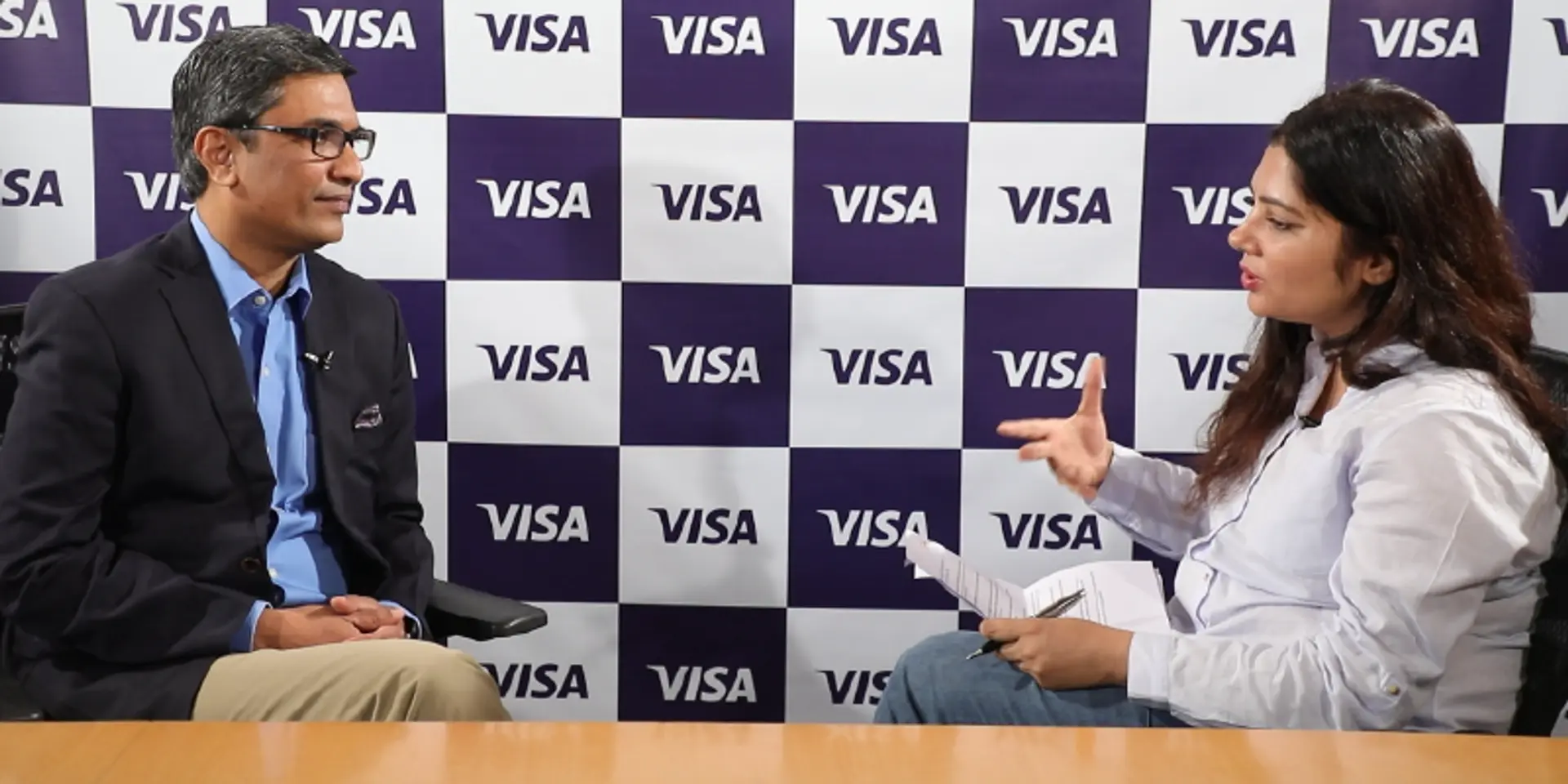Visa’s TR Ramachandran talks about financial inclusion through collaborative innovation and the huge opportunity for India’s fintech
With over three decades of experience in India’s financial services industry, TR Ramachandran, Group Country Manager, India and South Asia at Visa, has a unique perspective on India’s fintech. In an exclusive interaction with YourStory, he talks about the possibility of up to 50 fintech unicorns.
TR Ramachandran or Ram, as he is known informally, is visibly excited about India and the possibilities in the fintech arena. Having seen India evolve in the last three decades, particularly in just the last decade alone, he believes that India hasn’t just caught up with the best in the world, but rather leapfrogged to create a whole lot of enablement opportunities for the entire ecosystem.

“I think the next decade is going to be really, really interesting for anyone starting out in financial services or fintech or payments. I think it's a gold rush waiting to be tapped,” he says, adding that while the paradigm that RBI has put in is super progressive, there is a dearth of institutions ready to tap it, and therefore tremendous opportunity.
Expect a lot more fintech unicorns from India
Ram believes that India will see a lot more unicorns emerge over the next few years.
“If you think about the market cap of India and financial services’ contribution to that– around 60 to 65 percent – I think there’s scope for the next five or ten $100 billion companies and certainly 40 or 50 more unicorns in the fintech space,” he says.
Partnering will be key to succeeding and innovating
In the current dynamic, Ram feels that banks are trying to become more like technology companies and technology companies are trying to become more like banks. Fintechs have an incredible technology stack and a solution for the customer experience, and banks have brand, customer legacy and trust on their side, so a collaborative effort is important to drive innovation and success.
“The whole paradigm is of one of partnerships. Banks are forming incubators, accelerators, startup factories. Fintechs are figuring out how they can participate in this whole thing. Of course, there is a licensing angle to it, but there are ways to sort of put a consumer experience layer on top of the regulatory license in order to create an experience that's meaningful to the consumer,” he adds.
Creating zero margins for error
Talking about how security has to be front and centre for any fintech organisation, Ram acknowledged how it took just one data hack or leakage to take us two steps back. “We have a huge responsibility to get the architecture right. Visa invests billions of dollars in making sure we do all we can to get it right. From our own ethical hacking or making sure our firewalls are safe and secure because we have to do it. It's not about getting it right most of the time, we have to get it right all of the time. And the margin for error is, is absolutely zero.
On collaborating with startups
Ram admits that when it comes to startups, he is like a kid in a candy store. “It's super exciting to be in India at this moment in time. The volume of startups for one -- I believe India has the largest number of fintech startups, after the US. More importantly, the sheer talent and the ideas that the young generation have is remarkable. It's so exciting and energising to be in that space. We are just at the beginning of the journey to solve India’s financial inclusion challenges. And it takes a village -- banks, fintechs and startups,” he adds.

Talking about Visa’s collaborative approach to startups as a platform business Ram says, “Firstly, that being a platform business, we are blessed because we're not competing with startups. We’re enabling them to take it to market faster, quicker in a manner that's more scalable and more interoperable, which is great. Great for them. Great for us. In today's day of APIs and open banking, we're trying to make our front door a little wider and a little taller, so more people can come in at the same time.”
Expanding on the aspect of capital investments in startups, Ram said, “For the right partnership, capital won't be a constraint. But we are a strategic partner rather than a finance investor. Partnership comes in many forms. We have invested in companies in the past. But the more important thing is how do we take that player and make the go-to-market easier. We also help by leveraging our engineering talent – we have around 1,600 people in Bangalore.”
Neo Banking and its many opportunities
Talking about “neo banking” or open banking, the latest catchphrase in the fintech world, Ram said, “I think neo banks today are what tech-enabled NBFCs were two years ago – the flavour of the month. However, Capital One in the US started as a neo bank and they're very, very successful. The UK is also the poster child for many neo banks with Monzo, N26, Starling and Revolut as prominent examples.” Ram believes that while it is their time in the sun for now, neo banks would soon have to figure out compliance issues and regulatory challenges.
“On another note, the RBI has also come out with the account aggregator sort of license. And that's hugely exciting because that opens up the rails for open banking,” he added.
Macro trends in the FinTech space
Expanding on how fintech for digital inclusion was getting enormously popular, Ram cited inspiring examples from the region including Gojek in Indonesia and Bkash in Bangladesh, adding that there are plenty of lessons for India to learn in taking mobile financial services to the last mile.
“When you think about payments bank version 2.0 in India, I think they will have to figure that out in terms of how do we take the urban to rural. Micro-credit is another big trend as are platform play, solving for consumer experience and the verticalisation of consumer finance tax,” he added.
Getting the next 200 million people digital
Ram also found a keen subject in how the government has been very clear on the megatrend of digitisation and cashless systems, of permission and consent-based architectures and getting the next 200 million people into digitisation. “We are blessed to be living in a time where there's so much change happening and there's so much positive intent. Prime Minister Modi's government has been very clear on the megatrend of digitisation and less cash. You could quibble about the semantics, but the megatrend is not going away.” he added.
Enabling financial inclusion with the Visa Everywhere Initiative (VEI)
Ram was also particularly enthusiastic about the VEI, which was held in Sambalpur and also at tier 1 cities, and how Visa is encouraging the adoption of fintech is smaller towns and non-urban areas. “It's our way of reaching out to the community. We'd love for the fintech community to come forward and participate in this challenge and help co-create meaningful customer solutions. And those challenges include digital credentials - onboarding the next non-plastic digital credential and instant digital credential issues. Merchant acceptance and onboarding is another challenge we’re looking to solve by collaborating with startups.”
Visa’s approach to collaborative innovation in India is off to a great start with VEI.
“We started less than a month ago and have received over 240 applications so far. The enthusiasm had been remarkable. We also have 90-odd APIs available on the Visa developer platform. It's a sandbox where people come and experiment and play and figure out stuff absolutely free. Obviously, we love our traditional banks and we have 18,000 of them all over the world, but we want to add to that ecosystem to make it easier, faster for fintechs to onboard with Visa, to use our APIs and hopefully work with us to co-create and design consumer experiences on digital probably. If a startup partnership means that at some point in time we have to invest, we will do it in order to enable those companies, but not as a sort of financial investor,” he adds.
Women in fintech and a level playing field
One idea which Ram is very passionate about, and which Visa is also very keen on, is women in payments and Fintech.
“I hate to say this, but India is lagging on this parameter, and we shouldn’t. The amount of women engineering talent in this country is second to none. It's a shame that we are not doing as much as we should. When it comes to women’s participation in the urban workforce, we are behind countries like Bangladesh, Sri Lanka and Pakistan. In the Indian fintech landscape, if 49 percent of consumers are women, we should have 49 percent of engineers being women or designing for them. From Visa's experience, we have a healthy share of women to bring in diversity of thought perspective,” he adds.
Reading for inspiration
Ending on a personal note, Ram spoke about his most recent read. “ I love reading during flights they give you a great opportunity to finish a book. The last book I read, was a collection of essays by Bertrand Russell. The man writes so well,” he says, signing off.



